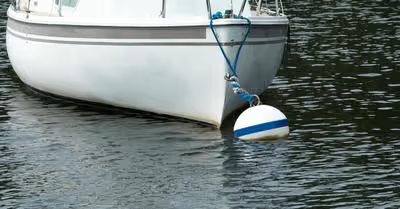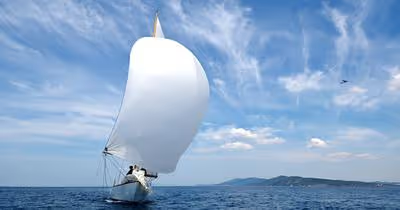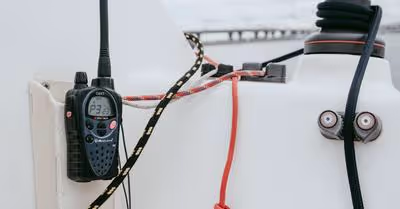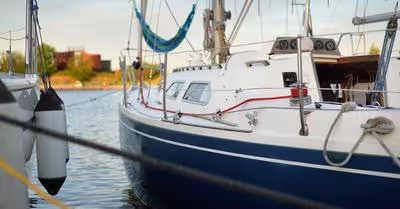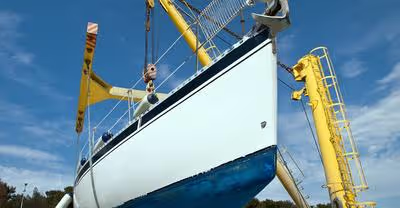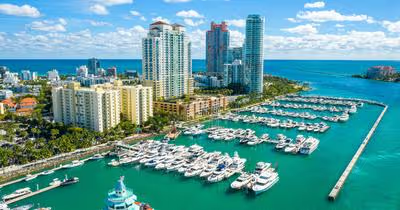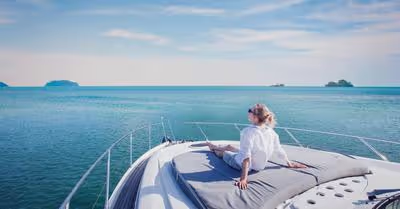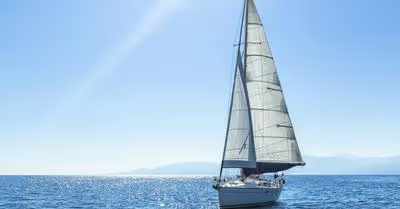Table of Contents
Sailing on a Lake vs. The Ocean
Before digging into the differences between sailing on a lake vs. the ocean, it is essential to understand that there is not much difference in the mechanics of sailing. It is crucial for you to adapt yourself to your environment and make the most of it.
If you have experience sailing in lakes, you may think you can use it to make your way across the ocean surface. This is partly true, but the ocean brings about its own set of challenges that you may have never encountered in a lake.
One of the most significant differentiating factors between sailing on a lake and the ocean is corrosion. Saltwater dramatically increases the corrosion rate of metal, which can lead to considerable damage to your boat. If these damages are not repaired, or you lag on maintenance, your boat can quickly run out of commission.
In fact, saltwater can adversely affect nearly every component of your boat ranging from the hose clamp to the smallest screw can be damaged quickly by saltwater. Sailing in the ocean means taking on a constant battle against corrosion. This means more maintenance and repairs, which adds to the costs.
Different Boat Design
Salt and the minerals found in the ocean can prove to be so detrimental to a boat that a vessel made for freshwater might not survive the harsh conditions of the ocean. If you have been a freshwater sailor for most of your life and plan to start sailing in the ocean with the same boat, you will pay a hefty price for repairs if you do not take the necessary precautions beforehand. If you don't change your inspection and maintenance habits, your beloved boat can quickly become a nightmare.
Before you head out into the ocean, it is essential to understand that ocean boats are different from freshwater boats. It is also necessary to learn how to maintain your boat properly, what areas you need to inspect and how frequently.
If you fail to upgrade a freshwater boat and make it sturdy enough to withstand the ocean, you might get through a few trips or sailing adventures. But you will be in for a nasty surprise when you attempt to maintain or repair the boat.
Let us look at some key differences between freshwater and ocean boats.
The Hull Design
The hull design plays a vital role in sailing. Some hulls are designed to keep the boat afloat, while others cut through waves and choppy water to keep the boat stable in harsh conditions. As you may have already guessed, freshwater boats hardly have to face strong waves. They are equipped with flat-bottomed hulls designed to keep the boat skimming over the water's surface.
Ocean boats often have V-shaped hulls shaped like a wedge from stern to bow. These hulls can cut through waves and ensure a smooth ride in choppy waters. The V-shape makes the hull more streamlined and cuts through the water rather than acting as a solid wall. However, the V-shaped design is unsuitable for shallow waters and requires greater propulsion power.
The Cooling System
Boats designed for the ocean require a proper engine cooling system if they are equipped with an engine, that is. The cooling system protects the engine from corrosion, as the coolant used keeps the system protected.
The engine is also equipped with automatic flushing systems, which ensure that all the water gets automatically flushed out of the engine. This eliminates the need for manual flushing required by many smaller engines.
Corrosion Resistance Systems
We have discussed so much about corrosion, so you must have a good idea about how detrimental it can be to your precious boat. A corrosion resistance system exists on both boats, but it is different.
Anytime two or more different metals are immersed in a saltwater solution, electricity is generated. One metal will wear down and cause the other metal to form deposits. If these metals are left in the solution for a long time, this process, known as galvanic corrosion, will destroy both metals.
A boat has many different metallic parts, such as a bronze propeller, a stainless steel shaft, metallic rudders, and several other components. All these metals are susceptible to galvanic corrosion. The solution to galvanic corrosion is to add another metal, which is quicker to wear down than others. This metal is usually referred to as the sacrificial anode or simply anode.
All boats are equipped with sacrificial anodes. However, the material used in the anodes is different. Freshwater boats employ a magnesium anode, whereas a saltwater boat requires an aluminum or zinc anode. The most common material used for anodes is zinc.
Hull Fouling
Boats running in the ocean are more susceptible to marine growths on their hulls. Algae and barnacles can quickly grow, causing your boat to slow down and lose efficiency. As part of routine maintenance, you will require extra time to remove the unwanted guests from the boat hull.
Weather Conditions
Weather can prove to be a challenge for even the most experienced sailors. Getting caught in a storm or rough waters in the ocean can pose severe risks for your boat and your life. If you are planning to head out into the open waters for your next boating adventure, it is advisable that you check the weather beforehand.
The ocean is more susceptible to harsh weather, such as strong tides and wind. If you are away from the shore and a storm strikes, you can have trouble navigating your way to the shore. Waves are tricky to encounter and can cause your boat to flip over.
On the other hand, boating in a lake gives you a serene and peaceful experience. You don't have to worry about the weather because harsh weather is not that common in lakes. Even if the weather does become sour, you know that the shore is only a few miles away.
In a nutshell, the weather conditions you have to face while sailing on a lake will be nowhere near what you can experience if Mother Nature goes furious when you are in the ocean.
Handling The Boat
Many sailors claim that sailing in the ocean is like sailing in a lake. But we believe that there are many more factors that you have to deal with when it comes to the ocean. To begin with, handling large waves on your boat can be a challenge. Maintaining the direction due to the tidal currents and wind will also be tricky.
To navigate through the waves and counter the wind, you will require more experience as both these forces of nature will throw you off course rather quickly.
Safety Factors
Your safety is the number one priority when it comes to sailing - as compared to the lake, sailing in the ocean presents many more risks. If you are in a lake and disaster strikes, you have a greater chance of being rescued than when you are in the ocean.
On the ocean, you need to share your sailing route clearly with your family and friends to make sure help can reach you if needed. Even with this precaution, it can still be a challenge for the rescue services to locate you. You can veer off course due to bad weather, strong currents, or faulty equipment.
Another risk in the ocean is marine life. This might sound too dramatic, but it is possible. Imagine a shark or a whale attacking your sailboat and flipping it over, leaving you in the water. The next thing you see is a few sharks circling you. It can be a very frightening situation.
You can also encounter dangerous animals in lakes, such as hippos or crocodiles. These animals, however, are a rare sight. But, overall, the best idea would be to remain in the boat and not outside of it when you are offshore.
Recent Articles




